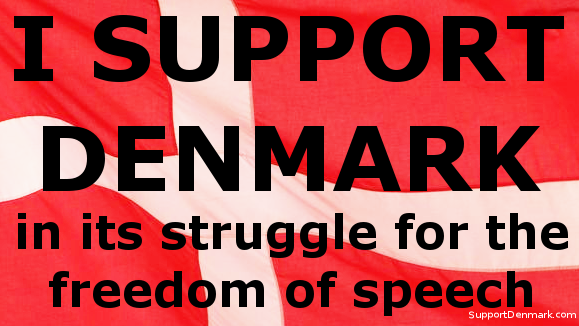

(Photos from supportdenmark.com and No Pasaran!)
i-2
Taiwan, China, and other things. Recovered from the defunct TypePad platform.
Mohammed over at Iraq the Model discusses the clerical preparation behind the "spontaneous" demonstrations in Iraq following the attack on the Shiite shrine in Samarra. His brother Omar describes new developments in the Saddam Hussein trial.
Meanwhile, Sandmonkey has a bit of evidence that the Europeans are starting to get fed up in the aftermath of "The Battle of Khartoon." He has more here.
Finally, Wretchard at The Belmont Club had a moving post a while back about World War II poem codes.
It’s not just a date in Taiwan, but a national holiday. The day commemorates the 1947 massacre of 27,000 Taiwanese by KMT troops from China, which followed a failed revolt instigated by the KMT’s rapacious occupational policies. It’s always an uncomfortable time for the capitulationist KMT party, which still wields considerable influence in Taiwan and indeed holds a majority in the Taiwanese legislature.
Interesting then, how the English-language pro-KMT China Post tries to paper over the massacre:
As a matter of fact, it is not important to find out the chief culprit. He may be Gen. Chen Yi, the administrator-general of Taiwan from 1945 to 1947. He may be Keh Ching-en, Chen’s chief of staff. He may be Maj. Gen. Liu Yu-ching, the commander of an infantry division sent to Taiwan from China to "suppress" what was considered a rebellion. He may be Chiang Kai-shek, the head of state, as [a new] special report charges. The fact is that they are all dead, and it’s of no practical use to blame any of them, unless the writers of the [latest] report and the man who commissioned it had some ulterior motive.
Just who exactly does the China Post think they’re kidding? Of course it matters whether Chiang Kai Shek, former dictator of Taiwan, was responsible for the February 28 Massacre. It matters a great deal whether Chiang Kai Shek was a decent leader who simply made an error in judgement in appointing a bad governor to administer Taiwan, or whether he was chief architect of an atrocity. If the former is true, then he deserves our sympathy. If the latter, his portrait should immediately be removed from Taiwan’s currency, public schools and government offices. Mass murderers do not merit statues in public places, nor should roads or buildings be named in their honor. There is no Adolf Hitler International Airport in Germany, for obvious reasons. (And let me be clear: Chiang Kai Shek was no Hitler, but 27,000 people winding up murdered isn’t small potatoes, either.) If the Generalissimo was behind the massacre, then I can’t for the life of me see why there should still be a Chiang Kai Shek International Airport.
The China Post‘s editorial goes on:
The [new] report is supposed to be a result of historical research. The writers are all historians, one of whom heads the Academia Historica. It seems that they forget what history is. History is understanding. History is a dialogue between the past and the present. History does not pass judgment. History is what notable events historians record just as Leopold von Ranke says "wie eigentlich gewesen (as is truly seen)."
What blather is this? "History does not pass judgement"? Of course it does! It’s history’s job to tell us who’s responsible for what. What did Nixon know, and when did he know it? Some historian somewhere positively SALIVATES over the possibility that he’ll be the one who finds the memo that definitively answers that question. Regarding the matter of World War I, historians initially assigned the lion’s share of the blame to the Central Powers. Twenty or thirty years later, revisionist historians found evidence that the war wasn’t caused by evil intent, but by a series of misunderstandings and tragic blunders. And about twenty years after that, the counter-revisionists found new evidence that once more pointed to prior German militarism as the war’s prime motivator.
And so it goes. Future evidence will be found to strengthen the claims of one side or another, for the study of history never ends. But the China Post‘s point that history is "a dialogue between past and present" eludes me. Yes, history can speak to me, at least in a metaphorical sense. And yes, people of today can ask questions about the past that perhaps never occurred to those who came before us. But precisely how does claiming that history is a dialogue between past and present invalidate the latest study regarding Chiang Kai Shek’s culpability?
If anything, this claim is an unintended DEFENSE of the motives of the authors of the study. For it is THEY who are engaged in dialogue with the past, asking tough questions – questions that were forbidden during the dark days under dictatorship.
There is then the obligatory attack on Taiwanese President Chen Shway-bian:
President Chen Shui-bian spoke at a meeting to mark the publication of the special report. He cited Chiang Kai-shek as the chief culprit. Is he one of those few people wishing to know who masterminded the massacre? Is it part of his hate-China campaign?
First, the China Post implies that few Taiwanese are interested in knowing the truth regarding the massacre. I have no reason to know whether this is true or not. But even if it is, how does it invalidate the question? Discovery of the truth, like discovery in general, is always pioneered by the few. Galileo was one of "those few wishing to know" about the heliocentric solar system. Why should scorn be heaped upon Galileo for wanting to know what most others were too busy or uninterested in learning?
The statement about Chen hating China is one of the reasons why I’ve avoided using the term, "pro-China" to describe the KMT and its political allies. For if one faction is pro-, then it’s natural for most to assume that the other side must be anti-. At that point, it’s too easy to characterize the "anti-China" parties as haters.
But seekers of Taiwanese independence are not necessarily China haters, any more so than young adults moving away from home are haters of their parents. It’s possible to like China (or ones parents) without wanting to live under the same roof as them.
The China Post feels that the next point is important, for it’s mentioned in Joe Hung’s column as well:
The people of Taiwan are not hateful people. Nor are they vengeful people. They know hatred makes everybody unhappy.
It’s indeed proper to point out that the Taiwanese people have not been hateful or vengeful, and have not visited revenge upon Chiang Kai Shek’s descendants. For Taiwan’s former dictator has been dead many years, and whatever his responsibility for the 228 Massacre was, his grandchildren are blameless of the crime.*
But the implication here is not that the Taiwanese should be congratulated for the extraordinary decency they’ve shown to the Chiang family, but that those asking questions should be condemned for bringing up painful periods of history. Let sleeping dogs lie; don’t threaten the peace of Taiwan. Murderers of 27,000 people mustn’t be blamed, for blame is something to be reserved for those who ENQUIRE about the guilt or innocence of historical figures.
Finally, the China Post closes with a plea for forgiveness:
In fact, they believe the feud between islanders and mainlanders that the February 28 Incident begot was disarmed when President Lee Teng-hui proclaimed Peace Memorial Day in 1998. He apologized for the massacre on behalf of his Kuomintang government.
The massacre should not be condoned, but what is needed is forgiveness, which does not seem to be included in the dictionary of President Chen and those who wanted to publish the special report.
A few points here. As a pro-KMT paper, it’s in the China Post‘s interest to argue in favor of forgiveness for the KMT. Let’s face it: it’s a tough job politically to get people’s votes after you’ve massacred their grandparents. People don’t usually forget little things like that.
This doesn’t mean that the China Post is necessarily wrong in asking people to move on; it just means that they’re not a disinterested party in the discussion. At the same time though, one should note that the China Post has no trouble demanding additional Japanese apologies for World War II, yet reflexively shrinks from calling for KMT apologies for the 228 Massacre. Former KMT leader Lee Teng-hui (whom the China Post openly despises) apologized ONCE they say, and that ought to be good enough for everybody**.
One last point, a point about forgiveness. Christians might read and be sympathetic to the China Post‘s calls for forgiveness, because it’s what their religion instructs them to do. Sometimes I get the sense that in America this is given a bit too freely, as illustrated by the parents of a school shooting victim I once saw on TV, who tearfully stated in front of the camera that they didn’t hate the perpetrator, and that they forgave him.
That interview was conducted on the same day their son was murdered.
The same freakin’ day. I’m sorry, that’s not godly; that’s downright creepy.
I’ve since become slightly familiar with the Jewish attitude towards forgiveness, which is a little more grudging than that of Christians. Jews too, believe that forgiveness is an imperative, but that the perpetrator must first apologize, and then promise not to repeat the transgression. Only then, can they ask forgiveness from the victim. At that point, only the victim – not his friends, not his family, not even God Himself – can grant that forgiveness.
It logically follows from this that murder is perhaps the one truly unforgivable sin.
Why?
It is unforgivable because only the victim can grant forgiveness. But once murdered, the victim is NO LONGER ALIVE to offer that forgiveness.
Agree with that approach or not, it’s something to think about the next time some huckster comes by opportunistically demanding from you forgiveness on the cheap.
* The Chiang family may be blameless for the crimes of Chiang Kai Shek, but they are not above using the force of the law to bludgeon those who would learn the truth. The editorial also states that John Chiang has mounted a lawsuit against academics who would dare to look at the historical record and suggest that his grandfather may have fallen somewhere short of sainthood. Perhaps Mr. Chiang should be reminded that the study of history should be conducted using reason, research and argumentation, rather than bailiffs, judges and 154 million dollar libel suits.
** This brings to mind a Finnish joke I once read in Ann Landers or Dear Abby. A woman asks her husband of twenty years why he never says, "I love you." The man replies, "I told you that the day we were married. Why should I have to repeat myself?"
UPDATE (Mar 4/06): The Taipei Times had an account the February 28 commemmoration, along with KMT chairman Ma Ying-jeou’s appearance at same:
Ma, who spoke in broken Hoklo, was heckled by the audience…
He spoke in Hoklo (the native Taiwanese language), rather than Mandarin? Wonder how his Hoklo compares to the pandas?
OK, cheap shot. Anyways, the hecklers called the capitulationist chairman a "slave of China", and shouted, "Long live the Republic of Taiwan."
As Rodney Dangerfield used to say, "Tough crowd, tough crowd."
By now, you’ve probably heard of the president of Taiwan’s decision to abolish the National Unification Council. I say "abolish" because there was a bit of translational hair-splitting on CNN International last night as to whether it was "abolished", or whether it now merely "ceases to apply".
The CNN anchorman seemed a bit hysterical, demanding to know how Chen could be so "reckless" as to abolish the NUC, after China had warned that doing so would cause wars, floods, plagues, and all of those other things that they usually say will happen whenever Taiwan dares to undertake democratic reforms. One should be aware that had Taiwan caved into China’s belligerent threats in the past, it would not now have direct presidential elections, a president from outside the House of Chiang, or a national referendum law (limited though it may be).
In the course of the discussion, CNN did admit that the council responsible for the tempest hadn’t actually MET in 7 years, but strangely neglected to mention that it had an operating budget of a whopping thirty dollars per YEAR. Perhaps they wanted to spare the viewer of the burden of deciding for themselves whether the reaction was just a little over the top. If so, then this would not be the first time it had done so.
(A side note here: am I the only one who finds it a bit rich to hear China crying "Provocation!" over the abolition of a defunct $30 a year council when it adds million dollar missiles WEEKLY to its arsenal targetting Taiwan?)
At any rate, the question of what a country ought to do with its moribund institutions is an interesting one. Any country with any amount of history behind it is bound to have its share of political anachronisms – relics of a bygone age. These it can either abolish, reform, or leave alone.
There are at least two arguments in favor of abolition: cost and the goal of limiting the size of government. In the case of the NUC, obviously the cost argument isn’t particularly relevant. However, if one believes that "government that governs best governs least", then it stands to reason that vestigial institutions like the NUC should be put to pasture once their usefulness expires.
The argument for retention is that anachronistic institutions DO serve a function: they remind us of our history, of where we once were, and of who we once were. I for one, will regret the day that Australia, or Canada, or Great Britain herself becomes a republic. But the NUC is not a visible reminder of the past like the monarchy, nor is its abolition irreversible. Future governments can always reinstate some kind of committee to consider guidelines for reunification if they deem it desirable to do so.
I therefore don’t see a compelling case for retention, but on the other hand, I don’t feel an overwhelming need for abolition. As for the possibility of reform, I don’t see what could be done on that front. The NUC was set up in 1990 and charged with the responsibility of determining a set of guidelines for reunification with China. Its job has been completed – what is there left for it to do? Give recommendations for water conservation policies?*
Now up to this point, all of this assumes that Taiwan can make these decisions in a vacuum, which it most certainly cannot. There is an 800 pound gorilla in the corner to consider. And this beast beats its chest and bellows with rage whenever Taiwan gives the merest hint of a suggestion of a possibility that it doesn’t want reunification. Sure, sometimes (maybe most of the time!) it’s all just an act, but how can you be sure of that with a government that shoots down American planes in international waters and instigates anti-Japanese riots over textbooks used in only 1% of Japanese schools?
When I pause to consider the gorilla in the corner, my thoughts on abolition of the NUC change from indifference to support. First of all, my visceral response to those who would introduce the threat of violence into political discussions is to deny them completely. Showing weakness in the face of of thugs and murderers emboldens them and serves only as an incentive for them to increase their demands. Like howling mobs of Islamic theocrats, the Chinese should be told that they will not be given their way.
My second reason though has to do with the principles of constitutional sovereignty. To surrender to the Chinese on this issue is to give them more than they deserve. Taiwan currently has five branches of government; if the Communist Party of China are granted veto powers then it will have six. Note that it’s not the number of branches of government that are objectionable (although having six branches may indeed be cumbersome) – what IS objectionable is the fact that one of the branches of Taiwan’s government would be unelected and unaccountable to the citizens of Taiwan.
This sixth branch of government would be completely hostile to democratic reform in Taiwan, and there would be no end to the mischief it could cause in any number of areas. Even on questions as seemingly innocuous as full adoption of the Gregorian calendar or the appearance of Taiwan’s former dictator on its currency would be subject to Beijing’s new-found suzerainty. The Taiwanese would be forced to relearn the habits of serfdom as their control over their destiny became more circumscribed.
Finally, it should be recognized by all that the sixth branch does not need to be enshrined in the Taiwanese constitution for it to exist in reality. It does not even need to be physically stationed within Taiwan, when a mere phone call to capitulationist party members might be enough to make them leap to their feet, and perform their masters’ bidding.
* Perhaps President Chen could have reformed the NUC by renaming it the National Empty Symbolism Council (NESC).
UPDATE (Mar 1/06): As mentioned in the post, a proposal for full adoption of the Gregorian calendar in Taiwan and the abolition of the Chinese Republican calendar has recently been mooted. (Taiwan currently uses both calendars.) Accepting the proposal would bring Taiwan more in line with the rest of the world, and would reduce confusion regarding expiration dates for exported foodstuffs.
(It’s currently Year 95 of the Chinese Republican calendar. What would YOU do if you had a pack of dried Taiwanese fruit with an expiration date of 96 or 97? If I recall correctly, I may have previously thrown out some food here myself after looking at the package and exclaiming, "Hey! This stuff was sitting around in that grocery store for the last ten years!")
On the other hand, the transition costs for changing calendars is likely to be fairly high. People would need new driver’s licenses, IDs and legal documents. I’m sure this could be grandfathered in, otherwise it would be a nightmare to have everyone lining up all at once at various institutions to get their papers redone. Prior to this, computer programs would have to be re-written, much like for the Y2K problem. I’ve no doubt that a lot of political scare-mongering will take place over this last requirement, but I think everyone should remember that Y2K came and went, and no planes managed to fall out of the sky.
Of course, the change would be a symbolic act, further distancing Taiwan from its Republic of China past. Pro-independence groups would be happy, capitulationist groups unhappy, and China…well, it’s hard to say. They obviously wouldn’t like the symbolism of Taiwan further rejecting its "Chineseness", but it would be a bit hard for them to oppose this with a straight face, because China ITSELF uses the Gregorian calendar.
David on Formosa has a post on the subject, and laments the politicization of a policy move that seems entirely rational. Michael Turton also has a post, where he points out how media bias affects two newspapers’ differing coverage of the issue.
[A study in the journal Evolution and Human Behavior] argues that blond hair originated in [Europe] because of food shortages 10,000-11,000 years ago. Until then, humans had the dark brown hair and dark eyes that still dominate in the rest of the world. Almost the only sustenance in northern Europe came from roaming herds of mammoths, reindeer, bison and horses. Finding them required long, arduous hunting trips in which numerous males died, leading to a high ratio of surviving women to men.
Lighter hair colours, which started as rare mutations, became popular for breeding and numbers increased dramatically, according to the research, published under the aegis of the University of St Andrews.
“Human hair and eye colour are unusually diverse in northern and eastern Europe (and their) origin over a short span of evolutionary time indicates some kind of selection,” says the study by Peter Frost, a Canadian anthropologist. Frost adds that the high death rate among male hunters “increased the pressures of sexual selection on early European women, one possible outcome being an unusual complex of colour traits.”
Blonde prehistoric cavegirls. Mmmmm. But what does the future hold?
A study by the World Health Organisation found that natural blonds are likely to be extinct within 200 years because there are too few people carrying the blond gene. According to the WHO study, the last natural blond is likely to be born in Finland during 2202.
A world without blonde jokes. I think the living will envy the dead.
[UPDATE (Jan 25 / 2013): Turns out the study claiming that blondness gene would disappear within 200 years was a hoax. –The Foreigner]

i-1
Further adding to Iran’s lofty reputation for academic excellence, an Iranian professor has critically analyzed Tom and Jerry.

His conclusion?
Zionist plot, what did you think?
Here’s a few quotes from one of Professor Hasan Bolkhari’s interfaith relations lectures. If you check out the video, you’ll see Iranian university students in a lecture hall, earnestly taking notes:
"The Jewish Walt Disney Company gained international fame with this cartoon…"
"Some say that the main reason for making this very appealing cartoon was to erase a certain derogatory term that was prevalent in Europe."
[…]
"If you study European history…[the] Jews were degraded and termed ‘dirty mice.’ Tom and Jerry was made in order to change the Europeans’ perception of mice.
[…]
"The mouse [Jerry] is very clever and smart. Everything he does is so cute…This is exactly why some say it was meant to erase [the previous negative] image of mice from the minds of European children, and to show that the mouse is not dirty…"
I can see that he’s put A LOT of thought into this. But I’m puzzled by one thing, though. The good doctor says that "Jewish Disney" feverishly spent its valuable time and money just so that it could rehabilitate the unfavorable image of a few European rodents. But then that very same "Jewish Disney" turns around and undoes it all by remaking "The Hitchhiker’s Guide to the Galaxy", which portrays mice as greedy, sneaky and manipulative puppetmasters.

Maybe the doc could use some of that valuable edjamacation to figure THAT ONE out for us.

UPDATE (Apr 6/06): Whoa, wonder how much grant money that prof’s been getting. Turns out Tom and Jerry were created by Warner Brothers, not the Disney company.
Facts sure are inconvenient things…
UPDATE (May 10/07): Another well-known Zionist organization, Hamas Al-Aqsa TV, seeks to further redeem the reputation of mice by featuring it’s own version of Mickey on a program for Palestinian children.
(Unlike the Disney version, however, Hamas Mickey calls for Islamic world domination and the annihilation of Jews.)
UPDATE (May 15/07): A Cox & Forkum cartoon on Hamas Mickey:

UPDATE (Jul 1/07): Amid the outcry, Farfur (otherwise known as Hamas Mickey) meets his end:
In the final skit, Farfour was beaten to death by an actor posing as an Israeli official trying to buy Farfour’s land. At one point, Farfour called the Israeli a "terrorist."
"Farfour was martyred while defending his land," said Sara, the teen presenter. He was killed "by the killers of children," she added.
i-4
AsiaPundit has a piece informing us that Roger Rabbit is now banned in Beijing. Meanwhile, Imagethief reveals the secret backroom discussions that led to the ban. As for myself, I think Roger’s own words provide us with a clue as to why authoritarians of any stripe would want to silence a harmless ‘toon. For as Roger once astutely observed:
"A laugh can be a very powerful thing. Why, sometimes in life, it’s the only weapon we have."

And that is what they fear.
i-1
Around the same time that the Cartoon Crisis was coming to a head, another situation was developing in Thailand. This controversy threatened to bring down the government of Thaksin Shiniwatra, the prime minister of Thailand.
Thais demonstrated in the streets and called for Thaksin’s ouster because Shin Corp., a company formerly owned by Thaksin, was sold to a state-owned Singapore company for 73 billion baht ($1.88 billion dollars). Their anger arose from the fact that the principals managed to avoid paying capital gains taxes due to the highly technical nature of the sale.
Initially, I sympathized with the demonstrators, but didn’t really see what constitutional basis they had for bringing down the government. Of course it doesn’t sit well when ordinary folk pay 7% ad valorem taxes, while the well-to-do pay nothing on $1.88 billion dollar stock sales. But the law’s the law, and tax avoidance is perfectly legal. You don’t fire prime ministers for obeying the law.
I also didn’t care for some of the hyperbole coming from the opposition newspapers. Rhetoric such as this:
[Thaksin’s] increasing hostility toward the country’s intellectuals has prompted sarcastic asides that he is less of a Hitler and more a modern-day Pol Pot. He may also even be more shrewd than the former Khmer Rouge leader because he has managed to appeal to the grassroots community despite his enormous wealth.
Pol Pot or Hitler, or simply a badly misunderstood leader, Thaksin is facing an increasingly strong alliance bent on toppling him through three-pronged assaults.
Uh, folks, some perspective, please. Thaksin isn’t Pol Pot, and he isn’t Hitler. Not by a long shot. There are NO death camps or genocides taking place in Thailand. You can’t even claim that he’s Pinochet, killing members of the political opposition.
Now don’t get me wrong, Thaksin DID order death squads to carry out the extrajudicial executions of about 2,500 drug pushers in 2003 – and for that denial of due process he SHOULD have been impeached. Instead, Thais "punished" him in 2005 – by re-electing him with an overwhelming parliamentary majority. Guess drug pushers aren’t the most sympathetic of minority groups.
So there’s no use crying over that spilt milk. As it turns out though, there’s a good argument that laws were bent and broken in the here and now. Prior to Thaksin’s election in 2001, he owned a majority stake in Shin Corp, a Thai telecommunications company, and was said to be the richest man in Thailand. After his election, he was required to sell off all but 5% of his shares, or place them in a blind trust. This he did, in rather an ingenious manner.
Thaksin complied with the law by placing some of his Shin Corp. shares in his relatives’ names. Other shares were placed in the names of his maids, servants, and even his personal chauffeur. What remained was deposited into a dummy investment firm called "Ample Rich". Ample Rich (jeez – what a name!) is interesting, because although Thaksin claims to have sold it, no one really knows who the current owners are. As a matter of fact, no one even knows where the company is headquartered – the documents filed with the Thai tax authorities list a false address in Singapore for it, although Thaksin insists it’s based in the British Virgin Islands.
This is how the scandal appears to me, then. Thaksin owned a company that had been granted a government monopoly. Once he became prime minister, he "transfered" ownership to those around him, and proceeded to change the laws governing his monopoly to make it even more valuable. On January 20/06, his party passed the Thai Telecommunications Act, which raised the maximum foreign ownership threshold (allowing him to sell more of his shares off). Three days later, all of the shares owned by his children, relatives, maids, servants and chauffeurs were simultaneously sold, as if directed by a single intelligence, to a company in Singapore. By strange coincidence, the shares held by the mysterious address-less Ample Rich were also sold to Thaksin’s children at the bargain basement price of 1 baht per share, then promptly resold to the Singaporean company for 49 baht per share.
As I said before, Thaksin claims that he sold Ample Rich and therefore has no control over it. If that’s true, then the new Ample Rich owners must have just randomly picked Thaksin’s two eldest sons out of thousands of investors and decided out of the goodness of their hearts to sell them shares at a fraction of their current market value. Either that, or the owners of a multi-million dollar investment house suffered a really bad case of amnesia, and forgot everything they ever learned in Econ 101 about profit-maximization.
Believe that if you wish. But a simpler explanation would be that Thaksin still controlled Ample Rich and wanted to give his sons an illegal 1 baht per share sweetheart deal.
The consensus seems to be that the biggest legal threat to Thaksin lies in the Ample Rich part of the trade. There is a certain sad irony in the fact that Thaksin, by all accounts a devoted family man, may have placed his two eldest sons in legal jeopardy along with himself.
As of this date, Thaksin has managed to survive politically. Over the past five years, wealthy supporters have bought out critical newspapers, or changed their editorial views by withdrawing advertising. Some independent media still exists in Thailand though, and indeed initial reaction to the Shin sale came from media mogul Sondhi Limthongkul. Sondhi’s own democratic bona fides are open to question however, especially since many have interpreted his request for the country’s military to "stand by the people" as a call for a military coup.
(A colorful side note: about 2,000 Thaksin supporters in a small town near Chiang Mai marched to a graveyard one night in order to place some kind of voodoo-like curse on Mr. Sondhi. I think that it was in a front page story in the Feb 10/06 {or thereabouts} edition of the Bangkok Post, but I’ve since lost the newspaper clipping.)
At any rate, Sondhi ceased to be the focus of the anti-Thaksin movement when the cause was taken up by members of the Thai political establishment. Their quest will be not be easy:
The first [attempt at impeachment] was aborted [on Feb 16/06] when the 27 senators failed in their attempt to [petition the Thai Constitution Court to begin impeachment investigations].
The second seems likely to meet the same fate. The Opposition, which has 124 House seats, will find it nearly impossible to gather 200 signatures of MPs to file a censure motion against Thaksin.
There’s a glimmer of hope in the third, the collection of 50,000 signatures to launch impeachment proceedings against Thaksin (as of [Feb 16/06] 20,000 signatures had been gathered.)
But the hard part is the impeachment process. When the Thammasat University Student Union gathers enough signatures, they have to send them to the Senate Speaker and then to the National Counter Corruption Commission. And that’s tricky, because there is no NCCC currently in operation. (emphasis added)
(From "PM slips past constitution court net again" in the Feb 17/06 edition of The Nation. Sorry, no link is available.)
UPDATE: Some members of Thaksin’s own party have asked him to step aside for the good of the party. Thaksin’s shifting statements on the matter offer some insight into his thinking:
"I will consider [resigning] in my next reincarnation."
“I will die in office.”
“I won’t step down until I can find a successor who can run the country and the party.”
“Even hardened criminals get their sentences commuted to half if they eventually own up to having committed the crime.”
UPDATE #2: Remember the possibility that 200 MPs could band together to force impeachment proceedings? Recall too, the numerical hurdle: members of Thaksin’s own party would have to vote for his impeachment. On Feb 24/06, Thaksin made good on his threat to dissolve parliament before this could happen.
How calling a snap election for April 2nd will save him is beyond me – unless he thinks that his ethical and legal improprieties can win him an even larger majority this time around.
Or maybe he’s simply been advised that the stars are right.
UPDATE (Feb 26/06): Blame my confusion as to Thaksin’s motives for calling an election in Update #2 on the lateness of the hour in which it was written. Thaksin’s goal is transparent. Change the subject. Talk about low-interest loans to Thailand’s rural poor. Discuss tax cuts for roadside vendors in Bangkok, the heart of the anti-Thaksin movement. Thaksin’s populist policies have been immensely popular among Thailand’s large population of the poor, so one of his goals will be to create fear amongst this voting bloc that his policies will be discontinued if he’s not re-elected.
Imagine if the Lewinsky scandal had broken, not in ’98 but during campaign ’96, and that Clinton had gone on to win by a landslide. At that point, Clinton would have been able to make the persuasive case that the people had reviewed his transgressions, and judged them to be inconsequential. He would have been politically untouchable.
Thaksin’s use of death squads in ’03 went unpunished partly because of his overwhelming victory in ’05, and he thinks he can repeat that success now. Thais have it in their hands the power to grant or deny him that impunity.
May they get the leader they deserve.
UPDATE #4 (Feb 26/06): The opposition is considering whether it should boycott the election, raising the spectre of some kind of Hugo Chavez situation. Meanwhile, Santa Claus is on his way, with lots of election goodies on his sleigh:
[Thaksin] spent two thirds of his hour-long speech talking about help he wanted to give to laborers, civil servants students and farmers hit by inflation fuelled by high oil prices.
Thaksin promised a rise in the minimum wage in Bangkok, where the opposition to him is strongest by far, and more debt relief for farmers in the countryside where 70 percent of Thais live and where his support is thought to be solid.
There would also be pay rises for civil servants and a plan to give part time jobs to students, Thaksin said.
Not one to settle for bribing the judge, Thaksin has decided to bribe the electorate.
UPDATE (Mar 18/06): Recall that Thaksin skirted the law by transfering assets to his employees. It turns out that:
At one point, two of his domestic servants were among the top 10 shareholders on Thailand’s stock exchange.
Video of a Feb 3/06 anti-Danish demonstration in London. (Click on "Prophet Mohammed Cartoon Protest".) Hat tip to The Counterterrorism Blog.
One slogan:
"Europe, you will pay. Your annihilation is on its way."
(Their wordsmiths must really be sleeping on the job because that one’d roll off the tongue a whole lot smoother without the "your". Ordinarily I’d say heads oughtta roll, but in this case, someone might take me literally!)
Watch for the animated fellow at the 1:47 mark:
"And we can bomb little Denmark, so we can invade their country, and take their wives as war booty!"
(And yet, the National Organization for Women has been shamefully slow in backing this important policy initiative. Don’t they know that Mohammed was "the world’s first feminist"?)
More slogans:
"George Bush, go to hell! USA, go to hell!" (Cindy Sheehan – they’re stealin’ your stuff.)
"Denmark, watch your back! Bin Laden’s coming back!" (Catchy. Gets the point across, and the metering’s perfect.)
"Kill, kill Denmark! Kill, kill Denmark!" (Aww, come on, guys, you’re not even trying. That one doesn’t even rhyme!)
"Europe, you will pay! Mujhadeen are on their way!" (A bit derivative – too much like slogan #1.)
"UK, you will pay! 7/7’s on its way!" (But don’t you DARE question their patriotism, you McCarthyite.)
"We want Danish blood!" (And here’s me, with a hankerin’ for their CHEESE. Guess there’s no accounting for taste.)
"Khaibar, Khaibar, o’ Jew. The Army of Mohammed is coming for you." (We are smelly, we are hairy. We got a rhymin’ dictionary.)

"Today’s threat to our national security is not a matter of military weapons alone. We know of new methods of attack. The Trojan Horse. The Fifth Column that betrays a nation unprepared for treachery. Spies, saboteurs and traitors are the actors in this new strategy. With all of these we must and will deal vigorously."
— FDR, May 26, 1940, fireside chat
i-1
Strategy Page has a few paragraphs on some of the more absurd elements of the dress regulations of the US military. Can’t say that I know too much about the subject, but I’ve heard a bit about the school dress codes in Taiwan. Knew a junior high school girl who was sent home for violating the rules for shoes. They were supposed to be 50% black and 50% white; hers were only 35% white. Bloody anarchist!
It’s a slippery slope here, people. Let one student get away with wearing shoes 35% white and who knows where it could all lead to. Sock hops. Maybe worse.